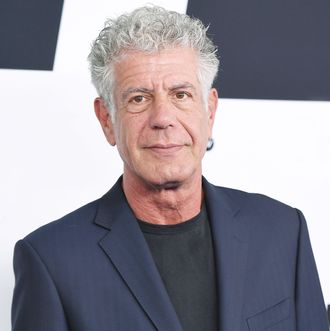
In the wake of the explosive report detailing years of sexual harassment and abuse at John Besh’s restaurants, people have been eagerly awaiting outrage from the industry’s leading men, and they’re finally getting it from Anthony Bourdain. The Parts Unknown host and former executive chef (he moved over into TV about 18 years ago) gave Slate a candid interview where he admits that he used to be “a guy in a guy’s world who had celebrated” the kitchen’s oppressive culture, and now is a little haunted by thoughts that he could’ve done better. He tells Isaac Chotiner that the way he sees it, the fight’s now on against the industry’s “meathead” culture.
As usual, he’s blunt and reflective. He has personal ties to the news — his girlfriend, actress Asia Argento, told The New Yorker that Harvey Weinstein raped her, and was forced to flee Italy as a result. That “certainly brought it home in a personal way that, to my discredit, it might not have before,” he says. Which set off alarm bells about why it took so long:
It’s like, wow, I’ve known some of these women and I’ve known women who’ve had stories like this for years and they’ve said nothing to me. What is wrong with me? What have I, how have I presented myself in such a way as to not give confidence, or why was I not the sort of person people would see as a natural ally here?
He “started looking at that,” and kept returning to his Kitchen Confidential book-tour days. He says after his talks, guys would approach him and “high-five me over the table with one hand and slide me a packet of cocaine with the other.”
I’ve had to ask myself, and I have been for some time, “To what extent in that book did I provide validation to meatheads?”
He adds that the book’s imagery, foul language, and sexually charged atmosphere were part of the “waning days of the sexual revolution” in the ’70s — not to excuse anyone’s bad behavior, he says, so much as to put everything in context:
I found myself in an environment where men and women spoke — gay men, gay women, straight men, straight women — we all spoke, people were speaking around me, mostly older, more experienced, in an incredibly frank way, usually self-deprecating way, about their sex lives …
It seemed honest and free of the kind of hypocrisy and stupidity that I’d seen surrounding sex growing up.
Eventually, men saw this “as a means to be shitheads.” But still — he was bragging about rising to the top of an industry whose system was very “phallocentric.” Because of that, he feels he can’t “hardly blame anyone for looking at me as somebody who’s not going to be particularly sympathetic.”
I was, let’s be honest, celebrating and bragging about surviving, we’re talking about a militaristic, male system that goes back in Europe back to the guild system, generally populated in the classic example by abused male children who were abused in kitchens, worked their way up through this sadistic system of hazing.
“God help you if you were a woman in those days,” he adds, saying that, like it was with Weinstein, “[t]he whole system is stacked against you” — unsympathetic male colleagues, lawyers, press outlets that were friendly to your abusers, bosses who could blackball and silence you. Bourdain’s next question is directed at himself as much as any of the victims: “Who can stand up to that? Nobody did for 20 years.”




